Now experts want the Army to reopen Covid NIGHTINGALE hospitals to prop up the failing NHS
>
Compulsory Covid isolation should be considered by ministers to ease the burden on the struggling NHS, a Labour MP claimed today.
Rachel Maskell, who serves on the Health Select Committee, said the point of testing was to ensure life ‘doesn’t continue as normal’ for those who are positive.
Mass testing and widespread quarantining formed part of the £2billion-per-month NHS Test and Trace scheme, that saw thousands of Brits forced to stay home during the hated ‘pingdemic’.
The calls follow UK Health Security Agency (UKHSA) bosses advising people to return to mask-wearing and to delay going back to work and school to avoid spreading bugs.
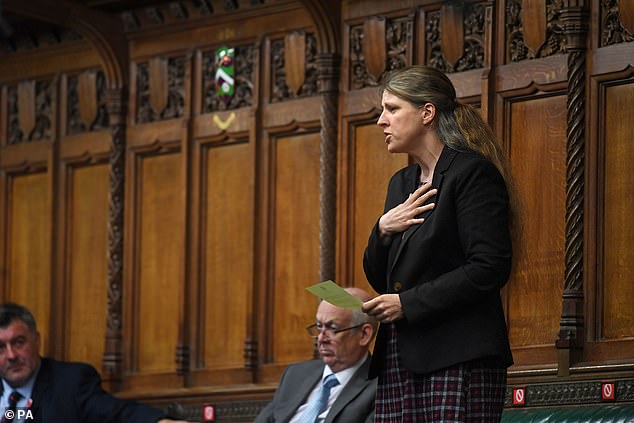
Rachel Maskell, who serves on the Health Select Committee, says Covid isolation should be made compulsory again and mass testing should be brought back because of the struggles faced by the NHS, as well as slipping levels of immunisation in the UK
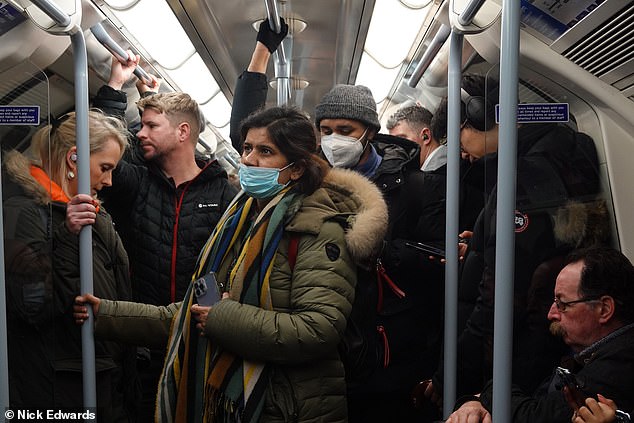

Pictured: People wearing face masks on the London Underground this morning after new advice has been given to curb rising infections as flu and Covid number increase
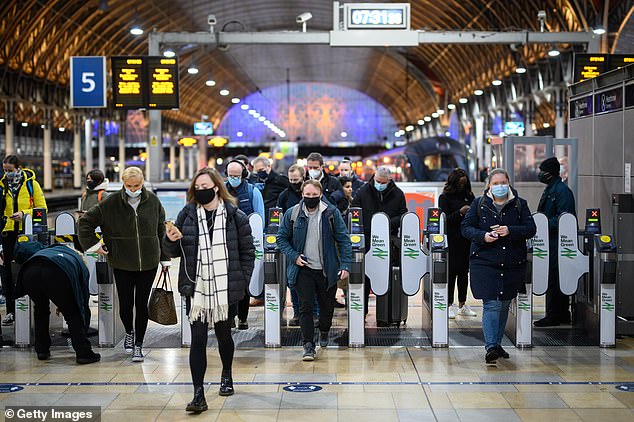

The calls come as London commuters were seen wearing face masks after UK Health Security Agency (UKHSA) bosses advised a return to pandemic-era mask-wearing
And in another hark back to the dark days of the pandemic, experts called for the reopening of Nightingale hospitals, staffed by the army, to prop up the ailing health service.
As part of a six-point plan, consultant Professor Rob Galloway suggested the hospitals, which were built during the pandemic but saw little use, could be reopened as social care settings.
Ms Maskell told MailOnline that as well as obliging arrivals from China to quarantine if they test positive, there needed to be a ‘discussion’ about bringing back more widespread isolation.
She said: ‘Obviously, we need people to isolate if they have got Covid.
‘It’s really important that they don’t spread that to vulnerable people. So we have to follow through the logic of what this means if people don’t isolate versus if people do.
‘The whole testing regime was the indicator of actually saying, ‘’we can release people who are well’’, which is a very positive thing, obviously recognising there is minimal risk, but there is some risk.’
She added: ‘If people are poorly, then the risks obviously escalate and the impact on others then, is quite significant.
‘So the principles which public health applied, should not change whatever stage you are of a communicable disease process.’
Asked whether self-isolation should be compulsory across the board again, Ms Maskell said: ‘Ultimately, public health is about managing risk.
‘And at the moment, it feels like there’s a distraction from certainly the focus government were giving Covid and other communicable diseases.
‘Now people are out and about, we know flu is really spiking now. It’s really concerning because people will die if they can’t get into the NHS when they need it, particularly people with a bad bout of community-acquired pneumonia or something.
‘And that’s what I’m really concerned about. How do we keep people well, keep people alive and protect people when the NHS is just so vulnerable at the moment?’
She added of obligatory self-isolation: ‘I think it’s got to be discussed. I don’t think you can avoid it.
‘What’s the point in testing and knowing someone’s positive if nothing changes? It’s a futile exercise.’
The legal requirement to self-isolate after testing positive for Covid was dropped in February last year as part of Boris Johnson’s plan to live with the virus.
Government advice still encouraged people who tested positive to stay at home and avoid contact with others.
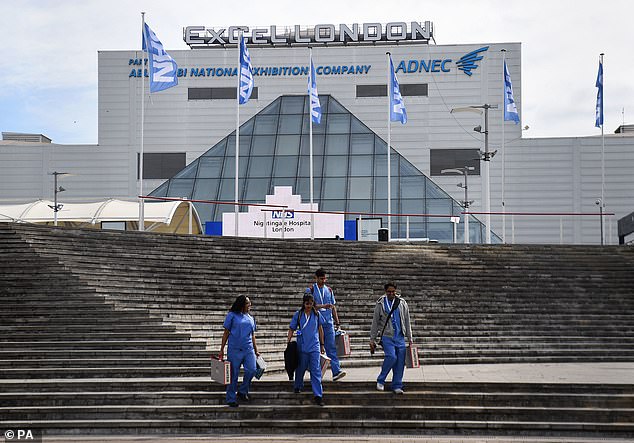

Experts have called for the reopening of Nightingale hospitals, staffed by the army, to prop up the failing NHS
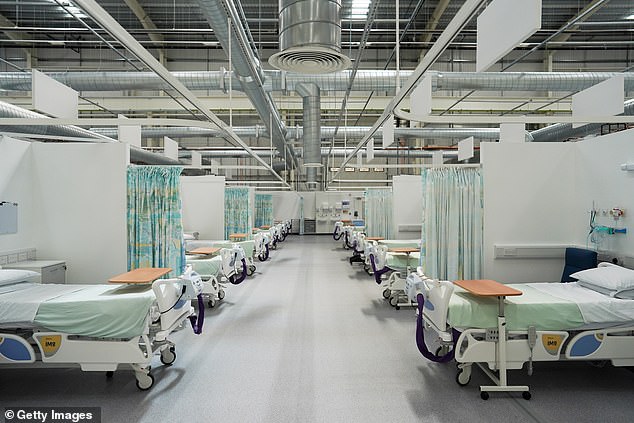

As part of a six-point plan to relieve pressures on the health service, consultant Professor Rob Galloway suggested Nightingale Hospitals (pictured is Nightingale North East) could be reopened as social care settings
Routine contact tracing, including venue check-ins on the NHS Covid-19 app, were also dropped on that date.
Prior to that, Brits had faced being ‘pinged’ on the app with quarantine notifications — forcing thousands to stay at home in the summer of 2021 before people stopped using it and health officials tweaked the algorithm to make it less sensitive.
Free lateral flow tests were stopped in April, as No10 set about dismantling its NHS Test and Trace scheme which cost up to £2billion in January that year alone.
The calls to bring back some of the hallmarks of the dark days of Covid come as an expert suggested reopening Nightingale hospitals — another costly scheme.
Step one of Professor Galloway’s ‘prescription to end Britain’s A&E crisis, save the NHS and protect lives’ was to ‘unblock beds’.
He said the easiest way to do this was to discharge the medically fit patients.
However, he said: ‘We could also use the Covid Nightingale hospitals (some were repurposed as vaccination or testing centres).’
He added that the plan would not be to use them as hospitals but as ‘Nightingale social care settings’ — which he said could be staffed by the Army and ‘volunteers such as carers’.
Dr Hilary Jones, a GP, presenter and writer on medical issues, echoed the call for the hospitals to be used for social care.
Speaking on Lorraine, Dr Jones said treatments such as having ‘a blood clot removed to prevent stroke damage to the brain’ were being missed due to NHS pressures being the the ‘worst it’s ever been’.
He said: ‘This is happening because of the delays, because of the pressures, because there are not enough staff and there are not enough beds. Something urgent has to be done.
‘We spoke about the NHS Nightingale Hospitals during the pandemic.
‘Why aren’t they open now to get 13,000 patients out of hospitals who don’t need an acute medical bed? That would make a huge difference straight away.’
He added that trusts are saying for people not to go to A&E unless they have a life threatening condition.
He explained that this meant those who are ‘just in pain or have a fracture’ are being advised to ‘stay where you are.’
Dr Hilary then asked: ‘Are we in a third world country now? Apparently we are.’
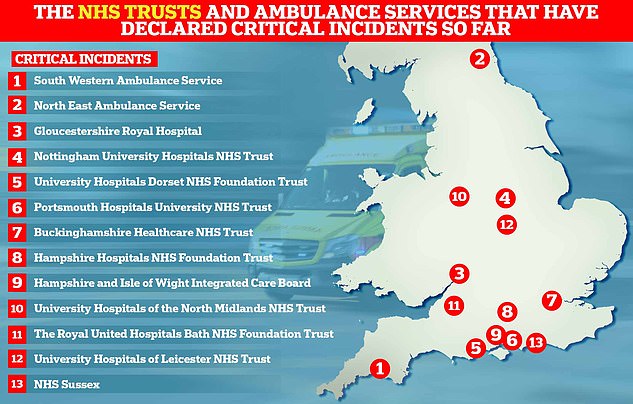

This map shows the NHS organisations which have declared critical incidents within the last few days


The flu-nami has swept across the NHS in England, the latest round of health service data shows, with over 3,800 admissions for the virus on December 23. Graph shows the number of beds on wards taken up by those with flu (red) and the number of beds occupied due to the virus in critical care (blue)
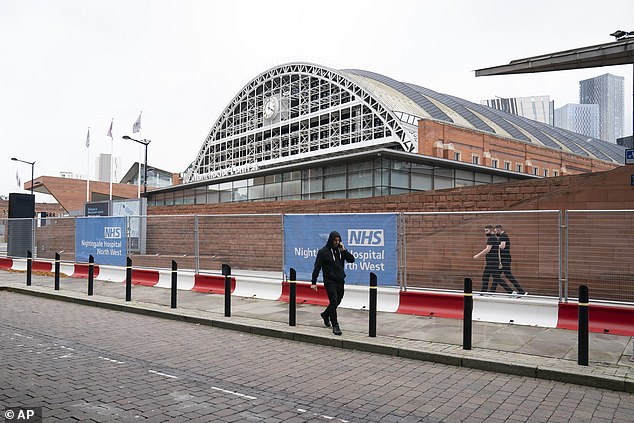

Professor Galloway said the plan would not be to use them as hospitals but as ‘Nightingale social care settings’ – which he said could be staffed by the Army and ‘volunteers such as carers’
The call comes as the UKHSA has advised unwell people to go back to pandemic-era face mask-wearing and to work from home.
It has also urged parents to keep their child out of school or nursery if they are ill and have a high temperature — classed as 38C or more.
The actions will help minimise the spread of Covid, flu and scarlet fever, which are ‘circulating at high levels’ and are ‘likely’ to keep rising in the coming weeks, it said.
Professor Susan Hopkins, chief medical adviser at UKHSA, said adults should ‘try to stay home when unwell’.
Those that do have to go out should ‘wear a face covering’, she said.
Sick Britons were also told not to visit healthcare setting ‘unless urgent’ and avoid vulnerable people.
Professor Hopkins said: ‘It’s important to minimise the spread of infection in schools and other education and childcare settings as much as possible.’
The ‘back-to-school advice’ also told parents to keep their child out of school or nursery if they have a high temperature.
Professor Hopkins said: ‘If your child is unwell and has a fever, they should stay home from school or nursery until they feel better and the fever has resolved.’
In other related news…
Are Brits ALREADY turning to masks? Pictures show commuters wearing coverings amid flu and Covid outbreak after SAGE expert’s plea to ‘protect the NHS’ – as poll reveals nearly 60 PER CENT don’t want any return of one of the main pandemic-era curbs
What MailOnline readers REALLY think about calls to wear masks again… so do you agree with 20 of the best-rated comments?
National Hell Service: Wife dies ‘after 16-HOUR ambulance wait’ and cardiac arrest survivor says he wished he’d got a TAXI instead – as 999 crews threaten to leave patients in A&E after 45mins in blitz on sluggish response times
